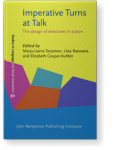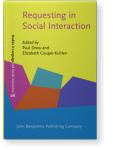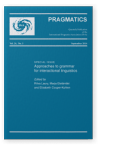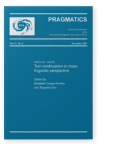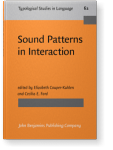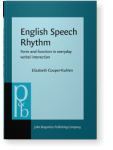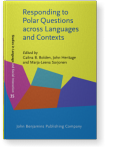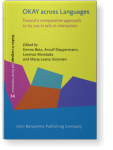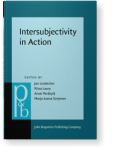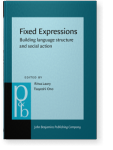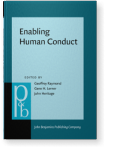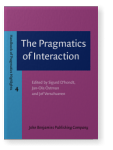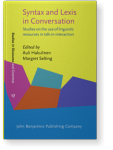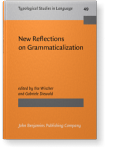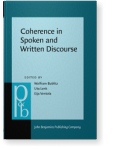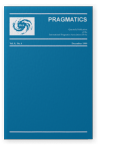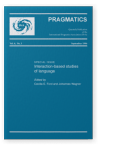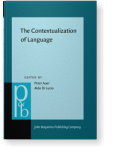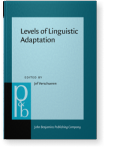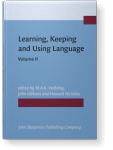Elizabeth Couper-Kuhlen
List of John Benjamins publications for which Elizabeth Couper-Kuhlen plays a role.
Book series
Journal
ISSN 2666-4224 | E-ISSN 2666-4232
Imperative Turns at Talk: The design of directives in action
Edited by Marja-Leena Sorjonen, Liisa Raevaara and Elizabeth Couper-Kuhlen
[Studies in Language and Social Interaction, 30] 2017. vi, 435 pp.
Subjects Discourse studies | Pragmatics | Syntax
Requesting in Social Interaction
Edited by Paul Drew and Elizabeth Couper-Kuhlen
[Studies in Language and Social Interaction, 26] 2014. x, 371 pp.
Subjects Pragmatics | Syntax
Approaches to grammar for interactional linguistics
Edited by Ritva Laury, Marja Etelämäki and Elizabeth Couper-Kuhlen
Special issue of Pragmatics 24:3 (2014) ca. 125 pp.
Subjects Discourse studies | Pragmatics
Turn continuation in cross-linguistic perspective
Edited by Elizabeth Couper-Kuhlen and Tsuyoshi Ono
Special issue of Pragmatics 17:4 (2007) ca. 125 pp.
Subjects Discourse studies | Pragmatics
Sound Patterns in Interaction: Cross-linguistic studies from conversation
Edited by Elizabeth Couper-Kuhlen and Cecilia E. Ford
[Typological Studies in Language, 62] 2004. viii, 406 pp.
Subjects Discourse studies | Phonetics | Pragmatics
Studies in Interactional Linguistics
Edited by Margret Selting and Elizabeth Couper-Kuhlen
[Studies in Discourse and Grammar, 10] 2001. viii, 438 pp.
Subjects Discourse studies | Pragmatics | Syntax
English Speech Rhythm: Form and function in everyday verbal interaction
Elizabeth Couper-Kuhlen
[Pragmatics & Beyond New Series, 25] 1993. x, 346 pp.
Subjects Discourse studies | English linguistics | Functional linguistics | Germanic linguistics | Phonetics | Pragmatics
2023 Chapter 12. Do English affirmative polar interrogatives with any favor negative responses? Responding to Polar Questions across Languages and Contexts, Bolden, Galina B., John Heritage and Marja-Leena Sorjonen (eds.), pp. 350–376 | Chapter
In research on talk-in-interaction, English affirmative polar interrogatives with any have been argued to favor a negative response, with supporting data drawn largely from medical interactions. Considering a range of mundane interactional settings, we find that the response favored by an… read more
2022 Can temporal clauses be insubordinate? Evidence from English conversation Interactional Linguistics 2:2, pp. 165–189 | Article
In this paper we aim to determine whether temporal clauses can be shown to be insubordinate in everyday American English interaction. In order to investigate grammatical insubordination in conversation, we operationalize the notion of ‘insubordination’ as a specific practice for designing a… read more
2021 Language over time: Some old and new uses of OKAY in American English Interactional Linguistics 1:1, pp. 33–63 | Article
This paper demonstrates how the tools of Interactional Linguistics can be applied to the study of change in language use. It examines the particle OKAY as used in everyday American English interaction at two different points in time, the 1960s and the 1990s/early 2000s. The focus is on the… read more
2021 Chapter 5. The prosody and phonetics of OKAY in American English OKAY across Languages: Toward a comparative approach to its use in talk-in-interaction, Betz, Emma, Arnulf Deppermann, Lorenza Mondada and Marja-Leena Sorjonen (eds.), pp. 132–173 | Chapter
This chapter is devoted to a study of the prosodic and phonetic realization of the particle OKAY as deployed in American English mundane conversation. Its primary aim is to explore the question of whether there are recurrent prosodic-phonetic formats associated with positionally distinct uses of… read more
2021 Directive turn design and intersubjectivity Intersubjectivity in Action: Studies in language and social interaction, Lindström, Jan, Ritva Laury, Anssi Peräkylä and Marja-Leena Sorjonen (eds.), pp. 61 ff. | Chapter
In this paper, we discuss turn design as a locus of intersubjectivity. We focus on two types of directives in Finnish interactions, turns formatted with second-person imperative and turns that contain zero person. Neither of these turn designs contains a separate subject phrase explicating the… read more
2020 Chapter 5. English why don’t you X as a formulaic expression Fixed Expressions: Building language structure and social action, Laury, Ritva and Tsuyoshi Ono (eds.), pp. 99–132 | Chapter
In this chapter we examine a formulaic expression in English, why don’t you + action verb/predicate (= WDY). We show that WDY is used in everyday conversation to carry out the social work of giving advice, as in why don't you try taking it again? We argue that this construction is a formulaic… read more
2017 What a difference forty years make: The view from linguistics Enabling Human Conduct: Studies of talk-in-interaction in honor of Emanuel A. Schegloff, Raymond, Geoffrey, Gene H. Lerner and John Heritage (eds.), pp. 315–325 | Chapter
In great part thanks to Manny Schegloff’s contributions, CA has brought with it a fresh new way of thinking about language. Three roughly chronological stages can be identified in Schegloff’s linguistic development: (1) casual observation about small-scale linguistic phenomena, including silence,… read more
2017 Chapter 7. In the face of resistance: A Finnish practice for insisting on imperatively formatted directives Imperative Turns at Talk: The design of directives in action, Sorjonen, Marja-Leena, Liisa Raevaara and Elizabeth Couper-Kuhlen (eds.), pp. 215–240 | Chapter
In this paper we focus on one particular practice for dealing with resistance to an imperatively formatted directive, namely that of re-issuing the directive in a second-person declarative form as a subsequent version. In our data, from Finnish everyday adult interaction, this practice is used… read more
2017 Chapter 1. Imperative turns at talk: An introduction Imperative Turns at Talk: The design of directives in action, Sorjonen, Marja-Leena, Liisa Raevaara and Elizabeth Couper-Kuhlen (eds.), pp. 1–24 | Chapter
2014 What does grammar tell us about action? Approaches to grammar for interactional linguistics, Laury, Ritva, Marja Etelämäki and Elizabeth Couper-Kuhlen (eds.), pp. 623–647 | Article
Using cases of misalignment and realignment in the unfolding of interactional sequences in which future actions and events are being negotiated in everyday English conversation, this paper demonstrates that participants distinguish between the initiating actions of Proposal*, Offer*, Request*, and… read more
2014 On divisions of labor in request and offer environments Requesting in Social Interaction, Drew, Paul and Elizabeth Couper-Kuhlen (eds.), pp. 115–144 | Article
Dividing the labor for achieving a common goal is a routinized practice that is found in both request and offer environments in English and Finnish everyday conversations. There are specific linguistic resources deployed in the two languages for this practice. Divisions of labor are typically… read more
2014 Requesting – from speech act to recruitment Requesting in Social Interaction, Drew, Paul and Elizabeth Couper-Kuhlen (eds.), pp. 1–34 | Article
In this introduction we outline some of the background to and evolution of the work on social action and requesting, then introduce some of the key analytic themes in investigating requesting in talk-in-interaction. This sets the scene for what is becoming a particularly significant perspective on… read more
2014 Introduction Approaches to grammar for interactional linguistics, Laury, Ritva, Marja Etelämäki and Elizabeth Couper-Kuhlen (eds.), pp. 435–452 | Article
2009 Prosody The Pragmatics of Interaction, D’hondt, Sigurd, Jan-Ola Östman and Jef Verschueren (eds.), pp. 174–189 | Article
2007 ‘Incrementing’ in conversation. A comparison of practices in English, German and Japanese Turn continuation in cross-linguistic perspective, Couper-Kuhlen, Elizabeth and Tsuyoshi Ono (eds.), pp. 513–552 | Article
This cross-linguistic study focuses on ways in which conversationalists speak beyond a point of possible turn completion in conversation, specifically on turn extensions which are grammatically dependent, backward-looking and extend the prior action. It argues that further distinctions can be made… read more
2007 Increments in cross-linguistic perspective: Introductory remarks Turn continuation in cross-linguistic perspective, Couper-Kuhlen, Elizabeth and Tsuyoshi Ono (eds.), pp. 505–512 | Article
A new area of research called Interactional Linguistics highlights linguistic structure in relation to naturally occurring interaction and is characterized by its cross-linguistic orientation. As a contribution to this new area of research, the present volume is a collection of papers with a… read more
2005 A linguistic practice for retracting overstatements: ‘Concessive repair’ Syntax and Lexis in Conversation: Studies on the use of linguistic resources in talk-in-interaction, Hakulinen, Auli and Margret Selting (eds.), pp. 257–288 | Article
2004 Prosody and sequence organization in English conversation: The case of new beginnings Sound Patterns in Interaction: Cross-linguistic studies from conversation, Couper-Kuhlen, Elizabeth and Cecilia E. Ford (eds.), pp. 335–376 | Article
2004 Conversation and phonetics: Essential connections Sound Patterns in Interaction: Cross-linguistic studies from conversation, Couper-Kuhlen, Elizabeth and Cecilia E. Ford (eds.), pp. 3–25 | Article
2002 On the development of final though: A case of grammaticalization? New Reflections on Grammaticalization, Wischer, Ilse and Gabriele Diewald (eds.), pp. 345–361 | Article
2002 Prosody Handbook of Pragmatics: 2000 Installment, Verschueren, Jef, Jan-Ola Östman, Jan Blommaert † and Chris Bulcaen (eds.), pp. 1–19 | Article
2001 Introducing Interactional Linguistics Studies in Interactional Linguistics, Selting, Margret and Elizabeth Couper-Kuhlen (eds.), pp. 1 ff. | Article
1999 Coherent Voicing: On Prosody in Conversational Reported Speech Coherence in Spoken and Written Discourse: How to create it and how to describe it, Bublitz, Wolfram, Uta Lenk and Eija Ventola (eds.), pp. 11 ff. | Article
1999 Quote – unquote? the role of prosody in the contextualization of reported speech sequences Pragmatics 9:4, pp. 459–485 | Article
This paper investigates how speakers of English can use the prosodic design of utterances to identity parts of these utterances as instances of reported speech. We will show that prosodic changes can function like quotation marks in written texts by clearly delimiting left and right hand… read more
1996 Intonation and clause combining in discourse: The case of because Interaction-based studies of language, Ford, Cecilia E. and Johannes Wagner (eds.), pp. 389–426 | Article
1992 Contextualizing Discourse: The Prosody of Interactive Repair The Contextualization of Language, Auer, Peter and Aldo Di Luzio (eds.), pp. 337 ff. | Article
1990 Isochrony and ‘Uncomfortable Moments’ in Conversation Learning, Keeping and Using Language: Selected papers from the Eighth World Congress of Applied Linguistics, Sydney, 16–21 August 1987, Halliday, M.A.K. †, John Gibbons and Howard Nicholas (eds.), pp. 269 ff. | Article


